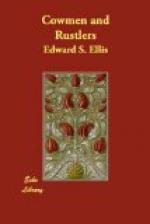“Now that I recall it, his voice did resemble Cadmus’,” said the sister, more thoughtfully.
“Of course, and I can tell you something more; he was among the rustlers with whom we had the fight yesterday. He did his best to kill me, and came pretty near succeeding. It wasn’t he, however, who put the bullet through my arm, for I dropped that fellow.”
“You frighten me!” was all that Jennie Whitney could say.
Sterry still smoked in silence. He was thinking hard, but it was his turn to be startled by the next remark.
“Larch Cadmus hates you, Mont, not so much because you are the enemy of all rustlers, but more because he believes my sister holds you in higher esteem than she does him.”
Sterry was clever enough to parry this compliment with considerable skill.
“For the same reason he is jealous of every gentleman whom Miss Whitney has ever met, for it would be a sorry tribute to any man’s worth if he did not stand higher in her regard than Larch Cadmus.”
“Well spoken!” said the young lady, relieved from what threatened to become an embarrassing situation for her.
Had her brother chosen he might have expressed what was in his mind, but he had the good taste to refrain. None knew better than he the deep, tender affection existing between his friend and his sister, though it had not yet reached the point of avowal and confession.
“Well, Mont, what are you going to do about it?” asked Whitney.
By way of reply, the latter twisted the “warning” into the form of a lamplighter. Then he applied a match to one corner, and held the paper until it had burned to the last fragment.
“That’s my opinion of Mr. Larch Cadmus and his gang, and I shall pay the same attention to them.”
“You are not wise,” ventured Jennie, who, with the awful memory of the preceding day upon her, could not but shudder at the peril to her friend, who had never been quite so near to her as during the last few hours, when he showed so much tender sympathy for her and her mother and brother in the depth of their desolation and woe.
“I thank you,” he said, with the same manly frankness he had always shown; “I have no desire to appear as a boaster or to make light of danger, but one of the truest adages is that it is not the barking dog that does the biting.”
“Don’t make the mistake of supposing it is not so in this case,” said Whitney, “and none should know it better than you.”
“I do not underestimate the courage of those fellows; they will shrink at nothing, but there is no more excuse for my running away upon receiving such a warning than there would be for all the inhabitants of Wyoming to leave the State at such a command.”
“The case is not parallel,” was the comment of Fred Whitney.
“Bear in mind that if I stay, as I intend to do, I do not mean to sit down and wait for those rustlers to pick me off. I count on having something to say and do in the matter; but, friends, I must bid you good-night.”




